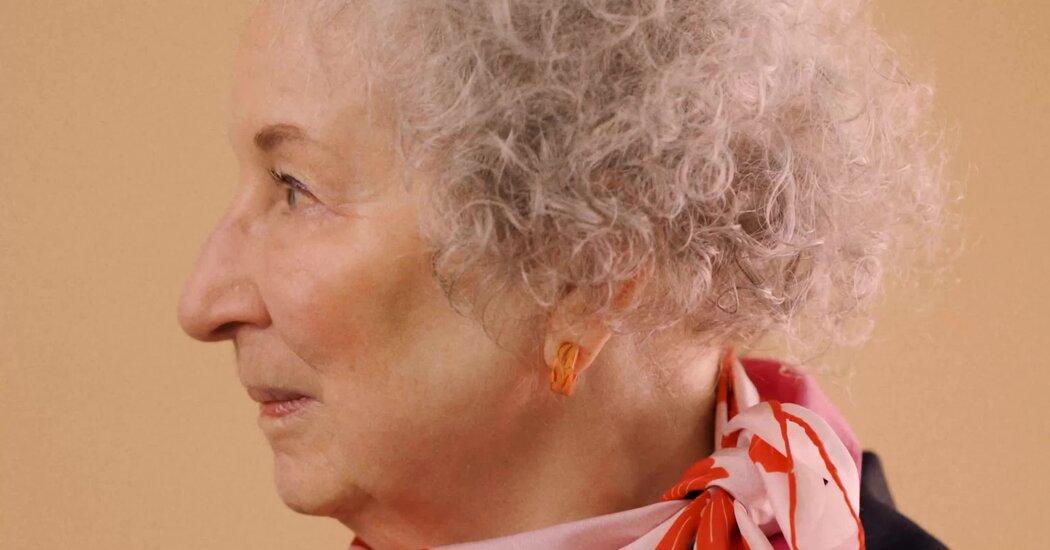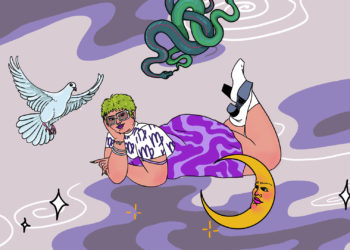Margaret Atwood doesn’t like being called a prophet.
“Calm down, folks,” was the withering response when I asked why her fiction often seems eerily predictive. “If I could really do this, I would have cornered the stock market a long time ago.”
Still, she concedes she’s been right on occasion.
When she published “The Handmaid’s Tale” in 1985, some critics were skeptical of Atwood’s vision of a future authoritarian America, where the government controls women’s reproduction and persecutes dissidents.
Since then, events in the novel that once struck unimaginative reviewers as implausible have come to pass. Abortion has been outlawed in parts of America. The rule of law feels increasingly fragile. Insurgents attacked the Capitol. Censorship is rampant — Atwood herself is a frequent target.
When I point out these parallels to Atwood, she still brushes off the idea that she can sense where things are heading.
“Prescient is not the same as prediction,” she told me recently when we met for lunch in Toronto. “People remember the times when you were right, and forget the times when you were wrong.”
At 85, Atwood is as droll, slyly funny and blunt as ever, prone to turning questions she doesn’t particularly like back on the interrogator. “And?” she’ll say in her low, gravelly monotone.
Wearing a bright pink and orange scarf that accentuated her piercing blue eyes, Atwood seemed energetic and upbeat. She had just returned from a two-week trip to the Arctic Circle, where she saw whales, polar bears and other wildlife, and was preparing for a global publicity blitz to launch “Book of Lives: A Memoir of Sorts.”
Memoir is one of the few literary forms Atwood hasn’t already tried. In a career that spans nearly six decades, she’s published more than 50 books, including poetry, short stories, nonfiction, speculative fiction, psychological thrillers, children’s books, graphic novels and historical fiction.
Her work has been adapted into ballet, opera, film, and television, including an award-winning television series based on “The Handmaid’s Tale.” She’s won the Booker Prize twice, and has sold more than 40 million copies of her books worldwide, in 50 languages. She’s a perennial contender for the Nobel Prize.
For years, Atwood maintained that she had no interest in writing a memoir; she thought it would be tedious. When I asked her what changed, she at first blamed her publisher.
“They wore me down,” she said.
Then she was quiet for a moment, and offered another answer.
“Two words: People died,” she said. “There’s things you can say that you wouldn’t say when they were alive.”
“Book of Lives” isn’t a blistering, score-settling tell-all, though there’s a dose of that. Atwood lays into childhood bullies who tormented her, blasts male critics and interviewers who condescended to her, questioning how she could write and still do the housework, and reveals how the Canadian literary scene was at times a hotbed of vicious gossip, jealousy and back-stabbing, particularly among poets.
“Poets are not, generally speaking, a fully balanced or unenvious lot,” she writes.
Atwood admits that, once crossed, she holds onto her resentments, and that she has occasionally taken revenge in her fiction.
“And?” she replied when I asked about her tendency to hold grudges. “It’s not an admirable trait, but why deny it?”
Mostly, though, “Book of Lives” is a book about the experiences that shaped Atwood as a writer.
“The story of your life is a story, and we’re always rewriting it, whether you’re a writer or not,” she said.
‘I know your names’
Atwood was born in Ottawa in 1939. Nicknamed Peggy, she grew up spending long stretches in the wilderness in northern Quebec, where her father, an entomologist, studied insects that caused forest infestations.
Books were one of few forms of entertainment. Atwood devoured “Grimms’ Fairy Tales” and staged plays and made comics with her siblings. In first grade, she started writing poetry and fiction; one early story was about a heroic ant named Annie.
An awkward child who had a caterpillar for a pet, Atwood sometimes struggled to fit in. At 9, she was tormented by a group of girls who subjected her to degradations, like leaving her out in the snow and burying her in a hole. She drew on the experience in her novel “Cat’s Eye,” about a woman who was viciously bullied by other girls as a child. But she always dodged when asked if the story was autobiographical because the “chief perp,” as she writes, was still alive (she no longer is).
Other villains from Atwood’s past escape public shaming. She describes a frightening night when she blacked out after her drink was spiked at a party, and woke up being groped by a boy on a couch in the basement: “I know your names, but won’t mention them here because it was a long time ago and anyway you are probably dead,” she writes.
Atwood got her start as a poet. She self-published her first book of poems, “Double Persephone,” in 1961, and sold copies for 50 cents. A few years later, she started to gain recognition when another poetry collection, “The Circle Game,” won a prestigious award.
Her provocative debut novel, “The Edible Woman,” a biting satire about a young woman who develops a strange relationship to food and struggles to eat, made waves in 1969. Some readers and critics saw it as a feminist manifesto — a framing that Atwood still disputes.
“I suppose if you squint really hard, you could say I was an early feminist,” she said. “But did I think the feminist movement was coming? No.”
The novel generated debate — female critics saw it as groundbreaking, men generally found it unsettling, she writes — but was far from an overnight success. Her first book signing was held in the sock and underwear section of a department store in Edmonton, where she sold two copies.
Atwood’s international breakthrough came with the release of “The Handmaid’s Tale,” a best seller that went on to become a classic of political dystopian fiction.
Though the novel was set in the future, Atwood looked to the present and past for inspiration. To create her fictional Christian autocracy, she drew from 17th-century Puritan New England, the oppression of women under Islamic theocracies and the rise of the Christian right in the United States.
Still, when the novel was published in 1985, the premise struck some reviewers as outlandish. Writing in The New York Times, the novelist Mary McCarthy said the novel’s implausibility rendered it “powerless to scare.”
“Oh, surely Margaret you’re exaggerating, this is never going to happen,” Atwood recalled.
Yet readers flocked to the book after it was shortlisted for the Booker Prize in 1986. And sales have surged in recent years, as the novel took on new resonance with the rightward shift in American politics and the Supreme Court’s overturning of Roe v. Wade.
It became an even bigger cultural landmark with the arrival of an acclaimed TV series. (Atwood herself appears briefly as a cruel indoctrinator who slaps the handmaid Offred, played by Elisabeth Moss.) To date, the novel has sold more than 10 million copies in English alone.
In 2019, Atwood published a sequel to “The Handmaid’s Tale,” titled “The Testaments,” which she’d been mulling for decades. While she was promoting the book, her longtime partner, the novelist Graeme Gibson, died after a cerebral hemorrhage, following a yearslong decline into dementia.
Rather than face an empty house, Atwood went on with her tour, in a daze. Later, she wrote about the disorienting experience of living without him in her story collection, “Old Babes in the Woods.”
She cried while writing the stories, but also found it comforting to imagine Gibson’s amused reaction. Sometimes, she can’t shake the certainty that “Graeme is in the next room,” she said.
‘The center is harder to defend’
“The Testaments” was a risky gambit — when it was announced, some readers questioned whether a sequel could live up to the revered original — but it became a best seller and won Atwood a second Booker Prize. It’s now being adapted into a television series; Atwood has a cameo. “I can’t tell you what it is,” she said.
With the resurgent popularity of “The Handmaid’s Tale,” Atwood has gone from being a literary giant to a cultural icon, “a combination of figurehead, prophet and saint,” she writes. The adulation, and the subsequent pressure to represent all of womankind, can be wearying, she said.
“You have to watch out for being idolized too much,” she told me. “It can very quickly go from that to, ‘I thought you were God and you didn’t solve my problem, you betrayed everything you stand for,’ which was actually not everything you stood for, it was something they decided you stood for.”
While “The Handmaid’s Tale” has been taken up as a rallying cry by the left, Atwood, who has been an outspoken advocate for free speech, has attracted criticism from across the political spectrum.
“I’ve had periods of being denounced for this or that,” she said. “The center is harder to defend, because you’re being attacked from both sides.”
She was condemned by some on the left for a 2018 op-ed in The Globe and Mail that questioned whether the #MeToo movement had gone too far and subverted due process for falsely accused offenders. She also faced a backlash for signing a letter that was critical of the University of British Columbia for firing the Canadian author Steven Galloway following allegations of sexual misconduct, which he has denied.
Atwood lays some blame on the left for the rise of book banning, which has surged in the United States in recent years.
“Let us not forget that the people who started canceling books and saying you couldn’t teach them in schools were the left,” she said, citing, as an example, the removal of “Adventures of Huckleberry Finn” for its use of racial slurs. “It started with, words are weapons, they can hurt you,” she continued. “And the right looked at this and thought, well this is a pretty good tool, let’s do it ourselves.”
Atwood has become one of the most frequently targeted authors in the United States. Nine of her books have been banned in 135 school districts across the country, according to PEN America.
She’s not too worried about it, and suspects that it’s only made the books more popular.
“If anything, it’s had the opposite effect, because you can’t really ban this stuff unless you get it out of bookstores, burn it at the stake and shoot the publishers. Are we ready for that yet?” she said.
Playful, goofy, ominous
Throughout her career, Atwood has resisted categorization. She’s often bucked being labeled a feminist, noting that “there are 75 different kinds, at least, of feminists.” She’s bristled at her futuristic stories being classified as science fiction, and prefers the term speculative fiction. She’s like a mad scientist when it comes to mixing genres: Squint at her books one way and they read as satire; another, and they look like dire dystopian warnings.
“She goes to very dark places in her fiction, she’s not afraid to be very honest about the female experience in a fundamentally misogynistic world, but she’s playful about it,” said Mona Awad, whose novel, “Bunny,” and its sequel were heavily influenced by Atwood.
Stephen King said he was struck by Atwood’s ability to infuse her frightening futuristic visions with gleefully weird details, like the freakish genetically modified animals in her postapocalyptic novel “Oryx and Crake.”
“Science fiction has never been so goofy and so ominous at the same time,” he said by email.
Atwood’s contrarian streak colors her worldview. She’s fascinated by science and technology — she reads pop science magazines for fun — but she also has a charming affinity for astrology and the occult.
In her memoir, she describes how a home she and Gibson once lived in was haunted by a spectral woman in a blue dress who would wander into her tiny writing room. She attributes her habit of holding grudges to being a Scorpio — specifically a Scorpio with Gemini rising and Jupiter in the eleventh house and the moon in Aquarius.
She’s studied Tarot and palm reading, and toward the end of our conversation, I asked her to read mine. After staring intently at my hands for a few moments, she gave me a detailed and at times uncomfortably accurate reading, pegging me as sensitive, conflict averse, an enthusiastic traveler and a closet introvert.
“You have a lot of superficial social skills,” she said, “but not very many close friends.”
Of course, one doesn’t spend two hours with Margaret Atwood without asking for her predictions on where we are heading, culturally and politically.
At first, the question provoked a curt reprimand: “You know I don’t do predictions,” she said.
When pressed, though, she offered a general political forecast, positing that America isn’t on the verge of authoritarian rule — yet.
Still, she confessed that when she traveled to the United States recently to receive a lifetime achievement award for bravery in literature, she felt a little unsettled crossing the border. “These are uncertain times,” she said. “The more we approach authoritarianism, the more likely they are to arrest famous people.”
As for her own outlook, Atwood remains surprisingly upbeat — a trait she attributes to the resourcefulness she developed growing up in the wilderness.
“I’m an optimistic person,” she said. “‘I’m doomed’ is very far down the line. I wouldn’t say ‘I’m doomed’ unless you’re about to be eaten by a bear.”
Alexandra Alter writes about books, publishing and the literary world for The Times.
The post For a Literary Saint, Margaret Atwood Can Sure Hold a Grudge appeared first on New York Times.




